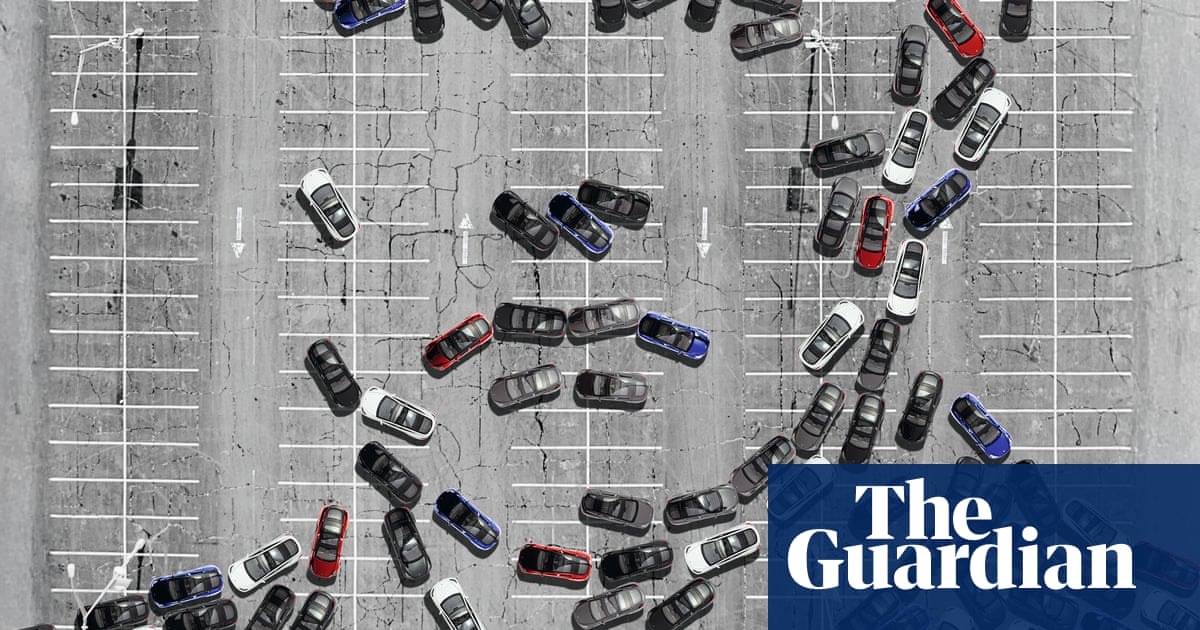- 1 Post
- 42 Comments

 1·5 months ago
1·5 months agoThanks! Somehow missed that, but I still don’t really understand the details, like how and whyit incorporates generative AI, and if these are for Netflix or for Netflix ad customers.

 16·5 months ago
16·5 months agoI can’t tell from the article what the AI side of this is? Are Netflix offering to make adverts for customslrs using AI? Are they just showing adverts in general from customers, including AI generated ones?
I don’t know if I’m doing something wrong, but I’ve read the article twice and still don’t know 😂

 1·5 months ago
1·5 months agoI’m just curious, but taking Elon’s ahem “politics” out of it, what kind of price would you start thinking about the cybertruck? Would you choose it over another electric pickup?

 8·5 months ago
8·5 months agoI don’t disagree, but I think it’s worth acknowledging that the US government could very easily regulate things so that Tesla are responsible for the financial burden they’re putting on the world when they inevitably scrap these vehicles.
That doesn’t address a bunch of other problems, but changing the global system of resource allocation is a hard thing, and making companies have some semblance of financial responsibility for destroying the planet is an easy thing that any government could do tomorrow. Just like how capitalism will (and did) inevitably result in child labour, but that can be (and was) outlawed directly.
I’m not trying to undermine your point about capitalism btw, just make the case that even within the constraints capitalism has, companies are getting away with an outrageous amount of destructive behavior.

 26·5 months ago
26·5 months agoCan’t pretend I’d be sad to see them crash out completely, although it does make me feel a little uneasy for repairability of existing Teslas.
Nazi or no nazi, it isn’t gonna be good for the planet to have a whole bunch of cars deemed irrepairable, although my guess is a buy out would stop that happening.

 12·5 months ago
12·5 months agoMusk was courting democrats until he fell out with them over labour rights. I think his “republican phase” started due to pushing for less workers rights in the US, so that he can make cheaper cars.
That was obviously a long time ago, before X and DOGE, he’s clearly in a delusional hate bubble at this point and expecting rationally explainable actions is unfortunately too big an ask.

 18·6 months ago
18·6 months agoYeah, I don’t understand (amongst many other things) why distinguish between 3,500% and 3,521%? What insane sum was used it generate that figure?
Also, at this point a part that costs $10 is now $362.10. Is there any point using tariffs here rather than just making them illegal?

 13·6 months ago
13·6 months agoI’m not gonna try to convince you otherwise because I think our world views are too different for that to be worthwhile l, but I do want to understand, when you say “are the problem”, what in your mind is the problem?
Is it that you think they’re taking up state resources, what resources do you think they’re using vs work that they do?
Is it because you have an idea if what the make up in America should be in terms of languages, birthplace or race?
Not trying to debate you, genuinely interested to understand why you feel like that.

 5·6 months ago
5·6 months agoTbf, all these headlines miss that indexes like the S&P 500 are still far down from pre-tariff-mania. Investors are more or less updating their views for how screwed the markets are, rather than betting that everything is fine.

 3·6 months ago
3·6 months agoThey have pretty high tariff rates in the EU tbf[0], obviously not anything like 104%, but still very high compared to normal rates.
I not sure what personal is, but I’m curious, are there stats on job losses for artists, translators or journalist since AI?
I would use AI for some tangential stuff, like translating a menu, but not sure how many would use AI in a place where they’d previously hired a translator.

 1·7 months ago
1·7 months agoYeah, you’re right. Sorry! Although US have definitely been one of the highest GDP per capita for that time (but like you pointed out, not the top which is what I original said)

 2·7 months ago
2·7 months agoGo Grey Socks!
Seriously though, this probably won’t affect billionaires because companies like Nike can move most of their operations overseas and avoid paying tariffs during their manufacturing process, and then just pass the cost of to US consumers when they sell to that market.
Even worse, when Trump put tariffs on washing machines (which Biden kept in place) one effect was that US made washing machines (not paying tariffs) jacked up their prices for US consumers simply because there was less competition.
It truly is a sucky world for non-billinaires.

 5·7 months ago
5·7 months agoI honestly have no idea, maybe? Deficit isn’t really debt though, it just means you bought more than you sold. The US isn’t in debt to Cambodia any more than you’re in debt with McDonald’s. They just have a one way buy/sell relationship.

 4·7 months ago
4·7 months agoI think you’re kind of being unfairly downvoted because it’s definitely underappreciated how much tariffs are used in modern trade deals.
Putting selective import tariffs on certain goods (like say car manufacturing) might be a wise move if you want to encourage the US to develop a manufacturing base. It’s worth noting that the US, and most other countries have been doing this selectively for years.
This is reeeaally far from the tariffs that have actually been anounced though, which are the highest rate the US has had in around 100 years, and applied pretty indescriminately. There are some goods that the US just can’t produce itself (like certain rare earth minerals that aren’t in the USA) but even worse, because of the insane logic of applying them to countries as they have been done, it opens up this type of event:
- A comany like Apple might assemble laptops in the US, but import parts like chips from, say, China.
- They now have around a 40% tariff on all chips, which is really going to drive up cost, and leaves them with two options.
- Option one, they bring all manufacturing into the US, which would take a long time to build up the infrastructure, and still really ramp up the price because wages in the US are so much higher than they are in China
- Option two, they outsource everything to say Mexico or Canada who don’t pay the tariffs on Chinese chips, and just pay the wholesale import tariffs are needed to bring things from Mexico/Canada to the US. They also get to skip out all the reciprocal tariffs that other countries are placing on the US in retaliation for the recently announces ones when they import out to, say, Europe.
Even option one is bad, because Apple might sell laptops internally, but the newly increased price makes them super uncompetitive with rival firms overseas, so it might still lead to a loss in overall jobs for US workers.
I’m not pretending this doesn’t suck - but US based international companies like Apple have a clear incentive to just forgoe the US as much as possible now. This kind of risk is why countries have traditionally been very conservative with changing tariffs.
I think you’re probably right that there might be an argument for countries to be less conservative than they have been, but the US government just cranked up the dial from 0 to 11 and we’re all about to find out what that might look like in real time.

 781·7 months ago
781·7 months agoIn case anyones looking at this and asking question like “Why has Cambodia been dunked with 49% when they’re clearly not a competitor to the US” or “Why is Trump claiming that the European Union has a 40% tariff on the US when the actual mean tariff on US goods into the EU is less than 5%”, here’s your answer to how these figures have been calculated.
- Take the US trade deficit with a given country (eg. China is $292bn)
- Take the total good imported by US (for China that’s $439bn)
- Divide the first figure by the second! Why? Who knows! It’s a number! Less talk more first grade arithmetic (if you’re still following that gives us 67%)
- That gives us a random number which we’ll pretend is that country’s tariff of US goods even though it’s completely unrelated in every way. We’ll divide it by two to get the new tariff rate for imports from that country. Why? Honestly if you’re still expecting there to be an answer to that question I’m wondering if you’ve been following. (that gives us 34%, well actually it gives us 33.5% but I’m not sure the Trump administration understands the idea of fractions so we’ll just round it up from there)
The “reason” behind this is that Trump seems to think trade deficits are really bad, which is bad news for the US because it’s had a trade deficit for the last 50 years. We’ll ignore the fact that based on GDP it’s been the wealthiest country in the world for that time though.
Anyway, just to give everyone an idea of how completely, utterly unrelated to anything meaningful that figure is, let’s take Cambodia. The country is very poor compared to the US so can’t afford to buy anything that the US manufacters (Cambodians aren’t driving round in Teslas or IMessaging each other). Some US companies use it for clothing manufacture because labour is cheap in Cambodia (see the previous bit about Cambodia being much poorer than the US). This means that Cambodia imports close to nothing from the US compared to what it exports, giving it a close to 100% trade deficit, so we wind up with a 49% tariff on Cambodia.
I genuinely don’t understand the mindset that looks at the US’s explotation of cheap labour in Cambodia and interprets the US as the victim in that relationship, but hey-ho maybe I’m just not biggly-smart enough to understand the 4d chess moves at play here. . .
Reference (because unfortunately none of what I said was made up and that geniunely is the calculation): https://www.theguardian.com/us-news/2025/apr/03/trumps-idiotic-and-flawed-tariff-calculations-stun-economists
Edit: After making fun of Trump for not understanding the enconomy, I went and conflated per capita GDP with GDP. Doh! Now corrected.

 3·7 months ago
3·7 months agoThere’s technically no upper limit, why not make it 10000% and really see what happens!

 9·7 months ago
9·7 months agoYeah, I think that’s one of the scariest things. Previous presidents have done a lot of terrible things, but there’s always been a basic rhetoric of morality- at oeast a pretence that official policy us “the right thing”.
The US’s latest bunch of clown have openly hateful and dishonest language, without any sense of shame. I don’t even think we’ve seen the beginning of the level of cruelty a country can achieve when it suddenly abandons any rule of law or accountability.

 1·7 months ago
1·7 months agoI’m not very knowledgable on Canadian politics, but agriculture is a sizable part of their GDP[1], seems like a fair enough view to value the jobs and industry it provides over having lower priced dairy?
More importantly, it seems like a choice that’s down to the voters of Canada, and if the USA doesn’t like it, they should negotiate to find something that worksfor both countries, rather than trying to use their economic heft into bullying the world.
[1] https://www.statista.com/statistics/594293/gross-domestic-product-of-canada-by-industry-monthly/


Agree! I don’t know why other people don’t get how convenient it is to have a distinct character for every single number imaginable.